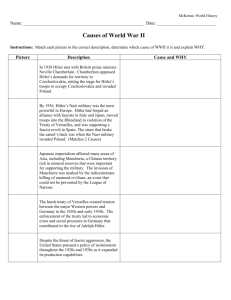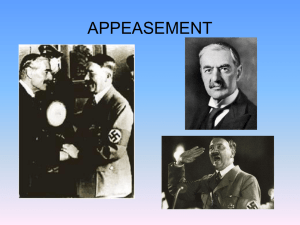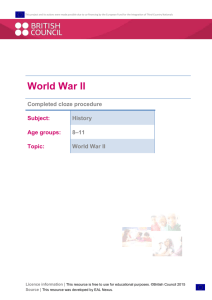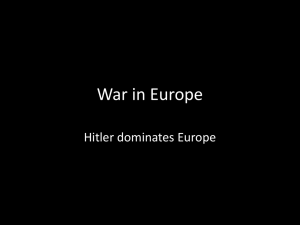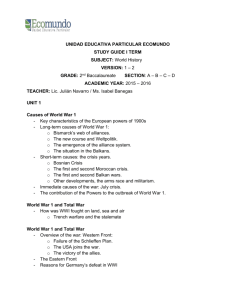Western Causes of WWII
advertisement
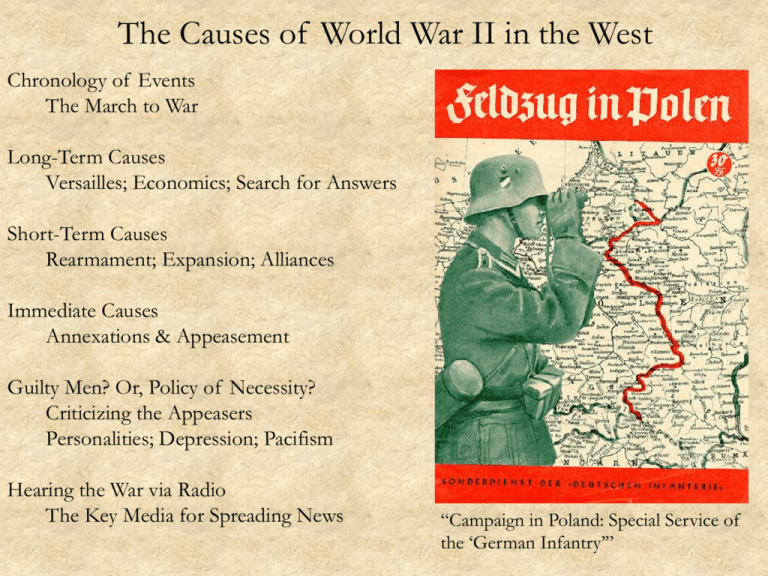
The Causes of World War II in the West Chronology of Events The March to War Long-Term Causes Versailles; Economics; Search for Answers Short-Term Causes Rearmament; Expansion; Alliances Immediate Causes Annexations & Appeasement Guilty Men? Or, Policy of Necessity? Criticizing the Appeasers Personalities; Depression; Pacifism Hearing the War via Radio The Key Media for Spreading News “Campaign in Poland: Special Service of the ‘German Infantry’” Chronology of the Onset of War 28 June, 1919 24 October, 1929 September, 1931 30 January, 1933 3 October, 1935 7 March, 1936 1 November, 1936 July, 1937 12/3 March, 1938 September, 1938 29 September October, 1938 15 March, 1939 30 March, 1939 7 April, 1939 22 May, 1939 1 September, 1939 3 September, 1939 Treaty of Versailles The Crash on Wall St. Japan invades Manchuria Chancellor Hitler Abyssinian Crisis Rhineland Remilitarized Rome-Berlin Axis Japan/China War Anschluss (Annexation) Chamberlain/Hitler 3X Munich Conference Sudetenland Prague Polish Guarantee Annexation of Albania Pact of Steel Invasion of Poland Britain Declares War The Expansion of Axis Territory, Spodek, 699 Long Term Causes, 1919-35 Treaty of Versailles Borders Redrawn Severe War Reparations Economic Crash Wall St.; Main St.; Worldwide Effects Political Instability & Fear Social Services > Military Arms Search for Order & New Answers Rise of New Governments Dictatorship/Totalitarianism Reactions vs. Liberal Democracy Mussolini’s Fascism Franco’s Conservatism Hitler’s Third Reich Japan’s Imperialism Short Term, 1935-7 Open German Rearmament, March ‘35 Goering’s Luftwaffe, vs. Versailles Hitler’s 36 Division Army, w/ Conscription Abyssinia/Ethiopia, 1935-6 Italy Conquers Last Stronghold Signal of Military Aggression to Hitler Rhineland, March ‘36 Remilitarized, vs. Versailles Rome/Berlin Axis, November ‘36 Alliance of Dictators Followed by Japan/Germany Pact Anglo-Italian Gentlemen’s Agreement, Jan. ‘37 Recognition of Mussolini’s Power Non-aggression; Use of the Mediterranean Immediate Causes, 1938-9 Anschluss of Austria (Annexation), March ’38 (Cf. Ausschluss/Exclusion, 1871) Czechoslovakia, April ‘38 Hitler’s Plan & Demands for Germans Prime Minister Chamberlain, ‘37-9 Appeasing Hitler; September Meetings Munich Conference, September ‘38 Consigned Sudetenland to Germany “We regard the agreement signed last night and the Anglo-German Naval Agreement [limiting German Navy, ‘35] as symbolic of the desire of our two peoples never to go to war with one another again. We are resolved that the method of consultation shall be the method adopted to deal with any other questions that may concern our two countries, and we are determined to continue our efforts to remove possible sources of differences and thus to contribute to assuring the peace of Europe.” Immediate Causes, Con’t Prague, March ‘39 Czechoslovakia Gone “Guarantee” to Poland Hitler’s Desire: Danzig Albania, April ‘39 Annexed by Italy Similar Aggression as Hitler Pact of Steel, May ‘39 Hitler/Mussolini Agree to Military Aid in Event of War Poland, Sept. 1, ‘39 German Invasion Britain Declares War, Sept. 3 Guilty Men? Journalists’ Mudslinging in 1940 Criticizing Governments’ Inaction Winston Churchill, MP from 1900 Voiced Need to Rearm Several Times; Hawkish Esp. the Royal Air Force; vs. the Growing Menace Anthony Eden, Foreign Secretary, ‘35-8 Ally of Churchill; Frequent Contact Resigned over Chamberlain’s Policy on Italy Rearmament Hitler in Secret, ‘33-5; Announced in ‘35 Calls for British Rearmament Denied Intelligence Agencies Ignored Policy of Necessity? Chamberlain’s Personality “I am a man of peace to the depths of my soul” Majority of Britons on his Side Economic Depression Massive Impact Still felt Social Programs > Military Spending Vast Sums Require Concrete Justifications Aversion to War Effect of the “Lost Generation” Horrors of Modern Mechanized Warfare Trust Hitler Signed the Agreement Mussolini’s Gentleman’s Agreement Japan not a Threat to Europe (Russian Buffer) Winston Churchill: October 16, 1938 On the Need to Arm Hawkish, Minority Attitude Importance of the United States Neville Chamberlain: September 3, 1939 On the Declaration of War Somber Tone of a Defeated Man Winston Churchill: June 4, 1940 On the Fight in France & Elsewhere Importance of the Fight in the Air Carrying on the Struggle Aid of the Empire Winston Churchill: June 18, 1940 On the Battle of Britain “Their Finest Hour” Winston Churchill: August 20, 1940 On the Air Battle Defending Britain Importance of the RAF Winston Churchill: June 22, 1941 On Hitler’s Turn toward Russia Ambitions for Empire (N.B.: Pearl Harbor, Dec. 7, 1941 Winston Churchill: May 8, 1945 • d • s • d The Instrument of Surrender, May 7, 1945; N.B.: Japan Surrenders August 15

